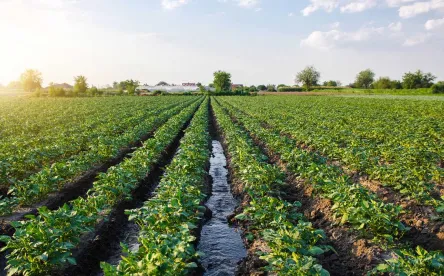The mere fact that the plaintiff was building livestock enclosures on farms did not necessarily preclude his entitlement to overtime pay under the agricultural exemption of the Fair Labor Standards Act (FLSA), the Seventh Circuit Court of Appeals has held. Therefore, the district court improperly dismissed the plaintiff’s complaint. Vanegas v. Signet Builders, Inc., 2022 U.S. App. LEXIS 23206 (7th Cir. Aug. 19, 2022). The Seventh Circuit has jurisdiction over the federal courts in Illinois, Indiana, and Wisconsin.
The Agricultural Exemption
One of the lesser-known overtime exemptions to the FLSA is the “agricultural” exemption. That exemption, found in 29 U.S.C. § 213(b)(12), applies to “any employee employed in agriculture” and includes primary and secondary definitions. The primary definition of agriculture involves what people typically envision as farming: “the cultivation and tillage of the soil, dairying, the production, cultivation, growing, and harvesting of any agricultural or horticultural commodities . . . , [and] the raising of livestock, bees, fur-bearing animals, or poultry[.]” Id. § 203(f).
The secondary definition pulls in in a broad variety of activities related to the primary farming activities, if they are “performed by a farmer or on a farm as an incident to or in conjunction with [primary] farming operations, including preparation for market [and] delivery to storage or to market or to carriers for transportation to market.” Id. This secondary definition contains language that became the focus of the lawsuit at issue, that is, did the plaintiff’s judicial complaint plead facts unequivocally demonstrating that his work was “incident to or in conjunction with” the primary farming operations where he built the enclosures, such that the exemption clearly applied?
The Lawsuit
Plaintiff Luna Vanegas, a Mexican citizen, was hired by defendant Signet Builders on an H-2A guestworker visa to build livestock enclosures on farms in Wisconsin and Indiana. Although Vanegas worked on land belonging to farms, he never had any contact with livestock. Vanegas filed a complaint on behalf of himself and his construction co-workers, alleging that they routinely worked more than 40 hours per week but were not paid overtime, in violation of the FLSA. In response, Signet filed a motion to dismiss under Federal Rule of Civil Procedure (FRCP) 12(b)(6), raising the affirmative defense that Vanegas and the putative plaintiffs are overtime-exempt under the FLSA’s agricultural exemption. Citing to Department of Labor (DOL) regulation 29 C.F.R. § 780.136, which provides that “[e]mployees engaged in the erection of silos and granaries” are “examples of the types of employees of independent contractors who may be considered employed in practices performed ‘on a farm,’” the district court agreed with Signet that Vanegas’s work qualified as agricultural labor, and dismissed the complaint.
The Court of Appeals Decision
Vanegas appealed and the Seventh Circuit reversed. As an initial matter, the Court of Appeals noted that, in this case, a motion to dismiss under Rule 12(b)(6) was inappropriate, as the FLSA exemption on which the defendant based its motion – and on which the district court based its dismissal – is not one of the affirmative defenses listed in Rule 12(b), and this is not “one of the rare [cases] in which the plaintiff had pleaded himself out of court by including ‘facts that establish an impenetrable defense to its claims’ in the complaint” (quoting Tamayo v. Blagojevich, 526 F.3d 1074, 1086 (7th Cir. 2008)). Rather, the defendant should have included the FLSA exemption defense in its answer, and then filed a motion to dismiss under Rule 8(c) after the pleadings had closed. Regardless, concluded the Seventh Circuit, questions of material fact remained unanswered that precluded dismissal of the lawsuit solely on the plaintiff’s complaint.
Looking to guidance from the DOL, the Court of Appeals cited to an interpretive rule explaining that three conditions must be met for work to fall within the agricultural exemption: (1) it must constitute an established part of agriculture; (2) it must be subordinate to the farming operations involved; and (3) it must not amount to an independent business. 29 C.F.R. § 780.144. Focusing on the third condition as dispositive of the appeal, the Seventh Circuit noted that DOL regulations establish a “fact-driven, totality-of-the-circumstances test” to determine whether the defendant’s construction business amounts to an independent business apart from agriculture. 29 C.F.R. § 780.145. Thus, the defendant’s (and the district court’s) reliance entirely on the “erection of silos and granaries” example ignored the remainder of that regulation, which clarifies that whether such construction workers are engaged in agriculture “depends, of course, on whether the practices are performed as an incident to or in conjunction with the farming operations on the particular farm[.]”
To that end, stated the Seventh Circuit, the “nuanced, fact-intensive inquiry” required to determine whether the construction work is incident to or in conjunction with the farming operations, or conversely is an independent business, “is ill-suited for resolution based only on the allegations of a complaint,” particularly given that “[w]ork that once was routinely performed by farmers” – for example, the production of fertilizer that is now routinely mass-created in factories – “can evolve into something separately organized as an independent productive activity.” Similarly, if the work at issue is routinely subcontracted by farmers rather than performed by the farmers themselves, that would be a “‘significant indication’” that the work is not agricultural. 29 C.F.R. § 780.146. In the case at hand, “[n]othing in the complaint addresses whether farmers in the modern agricultural economy ordinarily build their own large livestock enclosures or hire separately organized construction companies to do so – facts relevant only to the affirmative defense.”
Second, courts should consider whether the construction contracts are “in competition with agricultural or with industrial operations.” 29 C.F.R. § 780.146. “If a business’s primary competitors are not farming operations, then work performed for that business is unlikely to fall within the agricultural exemption.” Nothing in the plaintiff’s complaint addressed this question, let alone unequivocally answered it.
Third, courts should look at “the division of labor and supervision between a contractor’s employees and those of the farmer.” If there is minimal (or non-existent) overlap between the work performed by the farm’s employees and that performed by the contractor’s workers, “the logical implication is that the contractor’s work does not fall within the [agricultural] exemption.” Again, nothing in the judicial complaint resolved this question in Signet’s favor. On the contrary, the complaint alleged that Vanegas and his co-workers were employed and paid exclusively by Signet.
The Court of Appeals further rejected Signet’s argument that Vanegas’s work necessarily was “agricultural” because his H-2A visa had been approved, noting that the definition of “agricultural” work is broader under the H-2A visa application program than it is under the FLSA. After rejecting a procedural argument asserted by the company, and after briefly reviewing some other factors cited by the DOL regulations and looking to several analogous cases, the Seventh Circuit was “convince[d] [] that the district court adopted too narrow a focus when it looked only at the work that [the plaintiff] performed as an employee, omitting consideration of questions such as whether his employer was engaged in a productive activity separately organized from farming.” Thus, while ultimately Signet might be able to prove that the agricultural exemption applies to the work performed by Vanegas and his co-workers, it had not carried its burden to establish the exemption at this early juncture. Therefore, the Seventh Circuit reversed the dismissal of the case and remanded it to the district court for more analysis on the exemption’s application.
The Takeaway
This case brings to the surface some important reminders for employers regarding use of the FLSA’s agricultural exemption. First, as the Seventh Circuit noted, qualification as an H-2A visa worker does not equate to a worker’s status as exempt from overtime under the FLSA. Many vendors and farm labor contractors have a fundamental misunderstanding about this and will pass that along to their clients, leading to a widespread misconception among H-2A employers that these workers are automatically exempt from overtime. Moreover, the agricultural exemption is one of the more nuanced and complicated FLSA exemptions, often entailing a complicated factual analysis. Where an employee works, the type of employer for whom the employee works, and the ownership and identity of the commodities or products an employee is working with are all important factors in the application of the exemption. Finally, a number of states have their own agricultural exemption from overtime and these laws must be assessed when considering use of the exemption.




 />i
/>i

